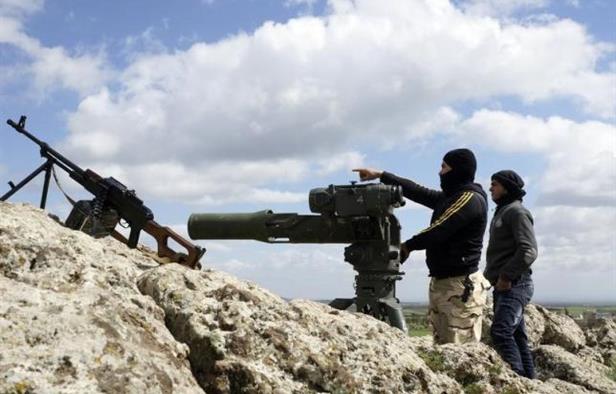By Kyle Orton (@KyleWOrton) on 19 January 2022

Al-Naba 317, page 3
A version of this article was published in The Arab Weekly
By Kyle Orton (@KyleWOrton) on 3 August 2018

An Israeli Merkava tank patrols on the border between Israel and Syria, on 20 July 2018. (AFP)
Israel has been conflicted on the Syrian rebellion: some saw Bashar al-Assad’s reliance on Iran and thus favoured his departure; some, especially once the uprising militarized and jihadi-Salafists made their appearance among the insurgents, favoured a let-them-both-lose policy; and some saw the risk of chaos and jihadists and preferred to stick with what they knew.
The official Israeli policy, stated in the early months of the protests, was to side with the people “demonstrating for freedoms” since “the devil we know in Syria [i.e. Assad] is worse than the devil we don’t”. Continue reading
By Kyle Orton (@KyleWOrton) on December 9, 2015
A version of this article was published at Middle East Eye.

A rebel fighter from the Free Syrian Army’s “First Battalion” takes part in military training on May 4, 2015, in rebel-held northern Rif Aleppo. (AFP, Baraa al-Halabi)
The Syrian opposition is meeting in Saudi Arabia between December 8 and 10 in an attempt to create a unified structure that can credibly sit across the table from the Bashar al-Assad regime in the internationally-organised peace talks in Vienna, and make a binding commitment on the path forward for Syria. Continue reading
By Kyle Orton (@KyleWOrton) on November 30, 2015
A version of this article was published at NOW Lebanon.

Rebels from the Southern Front in northwest Deraa, March 2015
In early November, the Foreign Affairs Select Committee released a report challenging the British government’s proposal to extend airstrikes from Iraq into Syria against the Islamic State (IS). Among other things, the report asked for a proposed political path to ending the Syrian civil war, a necessary prerequisite to defeating IS. On Thursday, Prime Minister David Cameron released a response, part of which said:
Military action against ISIL will also relieve the pressure on the moderate opposition, whose survival is crucial for a successful transition to a more inclusive Syrian government. Syria has not been, and should not be, reduced to a choice between Assad or ISIL. Although the situation on the ground is complex, our assessment is that there are about 70,000 Syrian opposition fighters on the ground who do not belong to extremist groups.
This number has blown up into a major political row, with many Members of Parliament and pundits taking their personal unfamiliarity with Syria’s military landscape as evidence that it cannot be so. The Labour Opposition has made the number of non-extremist rebels a focal point of their challenge to the Prime Minister’s proposal for moving forward in Syria, and one of Cameron’s own Conservative MPs referred to the number as “magical”. The challenge to the number is part of a longer-term trend, where a narrative has become prevalent that there are no moderate opposition forces left in Syria. The corollary of this view is usually the argument that the West should side with the “secular” Assad regime as the “lesser evil” to put down a radical Islamist insurrection.
Sidestepping the ignorance that goes into believing a blatantly sectarian regime propped up by an international brigade of Shi’a jihadists is secular: What of this claim that there are no moderate rebels left? It isn’t true, as I recently made clear in a paper for The Henry Jackson Society. Continue reading
By Kyle Orton (@KyleWOrton) on February 22, 2015
The United States is about to begin training some Syrian rebels, and giving them the ability to call in U.S. airstrikes, the Wall Street Journal reports. Continue reading
By Kyle Orton (@KyleWOrton) on January 29, 2015
This is the second of a four-part series looking at the United States’ increasingly-evident de facto alliance with Iran in the region. This first part looked at the way this policy has developed since President Obama took office and how it has been applied in Iraq. This part will look at the policy’s application in Syria; part three will look at its application in Lebanon, Afghanistan, and Yemen; and part four will be a conclusion. Continue reading
By Kyle Orton (@KyleWOrton) on May 2, 2014

Bashar az-Zoubi, leader of Liwa al-Yarmouk, the biggest brigade in Deraa and one of the biggest on the Southern Front. He is one of the main people President Obama’s ostensible switch to focussing on the south of Syria is supposed to benefit.
At the beginning of last month, the first solid evidence was presented of Syrian insurgents being trained by the Central Intelligence Agency. Continue reading
By Kyle Orton (@KyleWOrton) on April 6, 2014

The spokesman for the Islamic State of Iraq and Syria (ISIS), Abu Muhammad al-Adnani, gave a speech on 30 September 2013, entitled, “Lak Allah Ayatuha al-Dawla al-Mazluma” (لك الله أيتها الدولة المظلومة), roughly: “God Is With You, O’ Oppressed State” (The English translation released by Fursan al-Balagh Media gives the title as, “May Allah Be With You, O’ Oppressed State”.) The speech is primarily a ferocious attack on the Syrian rebel groups, accusing them of being part of a Western-led conspiracy, which includes the media stations of Arab governments and their “mouthpieces” throughout the region, to manipulate the coverage of ISIS such that it blackens their name and turns Muslims away from them.